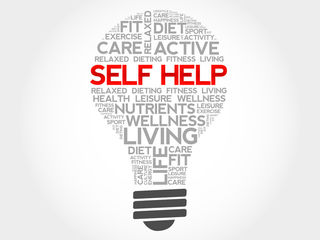Self-Help
How to Choose Effective Self-Help Resources
Find lots of proven options here.
Posted September 20, 2017
It seems that just about everyone has read a self-help book, attended a support group or surfed online for health information at one time or another.
Thousands of new self-help books are published each year. About one in five adults will attend a support group in their lifetime and 80 percent of Internet users have sought health information online. Americans spend an estimated $10 billion per year on self-improvement products. Health-related websites abound, along with online self-help programs and even smartphone apps for help with just about any issue related to emotional distress or habit change.

There are countless self-help options to help you improve your mental health and to assist with recovery from mental illness and addiction. It’s been shown that about 75 percent of people who attempt to work on mental health issues do so on their own rather than with the help of professional treatment. So self-help will be the only kind of help that many people will accept. And self-help does have several advantages: it’s affordable, easily accessible, and anonymous.
Yet, self-help is often combined with professional treatment. Studies show that most practicing psychologists routinely recommend one or more self-help measures (books, support groups, websites, autobiographies, and movies) as an adjunct to psychotherapy. Formal therapy sessions may only comprise an hour or two each week, so using self-help options can add a substantial amount of time between therapy sessions for engagement in therapeutic activities.
But is self-help effective?
According to psychologist John Norcross and his colleagues in the book “Self Help That Works: Resources to Improve Emotional Health and Strengthen Relationships,” self-help is much better than no treatment and many self-help resources are consistently found to be generally effective. For some issues, self-help is almost as effective as professional intervention.
However, more than 95 percent of self-help resources have no controlled scientific research about their effectiveness. Some self-help approaches even contain strategies not recommended by available research. And just because a book reaches the bestseller list doesn’t mean it’s effective.
So, how do you find effective self-help resources?
Sometimes people ask me for recommendations for self-help books, support groups, or websites to learn about mental health topics or to assist in recovery from mental illness and addiction. Since I’ve reviewed many of these resources over the years, I’m usually able to recommend specific ones if I’m already familiar with them and feel confident about their effectiveness.
However, I’m not always aware of resources for some specialized topics and therefore I don’t immediately have a solid reference upon which to base an informed recommendation.
This is where the “Self Help That Works” book really shines. The overall goal of the book is to help people select effective self-help resources and to assist professionals in recommending them to their patients.
The book summarizes 12 national surveys which gathered quality ratings of more than 2000 specific self-help resources (self-help books, autobiographies, and films) from over 4800 US clinical or counseling psychologists. In addition, psychologists rated the research support for online self-help programs and websites.
These ratings were then organized into over 40 chapters on specific behavioral disorders and life challenges. Based on the data collected, each chapter offers starred (one = not recommended to five = strongly recommended) ratings and descriptions of self-help books, autobiographies, films, online self-help programs, and websites.
Additionally, a dagger symbol is used if a particular resource was rated negatively by the professionals. Well-established support groups for each topic are also listed but not rated.
The topics covered in the chapters are quite diverse, including:
- Mental disorders involving mood, personality, thought, childhood and addictions, plus several others
- Interpersonal issues such as abuse, bullying, and violence
- Developmental issues related to adults and older adults, and parenting of infants, children, and adolescents
- Relationship issues such as marriage, divorce, gender, and sexuality
- Self-improvement topics including assertiveness, career issues, communication, spirituality, and stress management
Another extremely helpful feature in the book is guidelines for consumers to use when considering various self-help resources. These very practical tips include:
- Don’t choose a resource based solely on its advertising.
- Make sure the resource’s claims are specific and reasonable.
- Look for resources which clearly state their limitations.
- Review the author’s professional credentials.
- Study any available research supporting the self-help resource.
The book concludes with strategies for mental health professionals to successfully include self-help resources along with traditional therapy. Among these many helpful suggestions, practitioners are reminded to:
- Don't devalue self-help.
- Take time to learn about self-help options.
- Get feedback from patients about their self-help experiences.
- Offer support with more difficult self-help techniques.
- Recommend self-help measures that have been supported by research.
I use the “Self-Help That Works” book as a go-to reference for selecting effective self-help interventions. It’s a treasure trove of useful information and is highly recommended.
It’s very important to remember that while self-help measures can be very effective and beneficial, self-help is not a replacement for professional treatment. Each person’s issues are unique, so it’s always best to consult with a mental health professional to determine the best overall course of treatment for your particular concerns.
Copyright David Susman 2017
References
Norcross, J. C., Campbell, L. F., Grohol, J. M., Santrock, J. W., Selagea, F., & Sommer. R. (2013). Self-help that works: Resources to improve emotional health and strengthen relationships (4th ed.) New York: Oxford.




